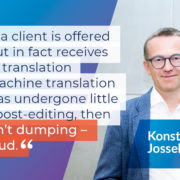Is dumping a current issue in the translation industry?
It is, but a much more pressing one is clients’ lack of awareness about the translation market – where they can find reliable suppliers, what the standard processes are and what quality looks like, which technologies are used, and how prices are set.
No client with knowledge of the industry would pay as little as EUR 3–6 per page for TEP services, but unscrupulous suppliers can take advantage of clients’ unfamiliarity with the sector. When a client is offered TEP but in fact receives a poor translation or a machine translation that has undergone little or no post-editing, then this isn’t dumping – it’s fraud.
There was a great example of such fraud recently – company A issued a call for tenders, which was won by a translation agency offering an extremely low price. But just a month later, A was forced to issue a new call for tenders, having assessed the quality of the resulting translations and realized that they’d been conned.
You can also find examples where companies sell MT/MTPE services despite the client’s requirement for TEP. Remember the saying: “it’s not dumping, it’s technology.”
In my view, this kind of fraud that is perpetrated on clients is just as damaging as dumping. The challenge for industry leaders is to educate clients so that they are more aware of all aspects of the translation market, including quality, processes, technologies and suppliers.
But about dumping. What we mean by this is temporarily selling goods or services below cost (i.e. it does not affect their quality) with a specific purpose in mind – entering a new market or redistributing market share, for example. That’s the economic theory, and it’s what many Japanese and German firms did as they sought to launch themselves on the international market.
It’s also a very unwelcome phenomenon, but defrauding clients is a far greater evil.





